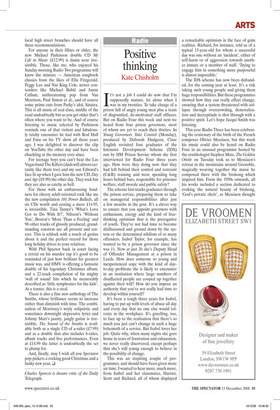Positive thinking
Kate Chisholm
It’s not a job I could do now that I’m supposedly mature, let alone when I was in my twenties. To take charge of a prison full of angry young men plus a team of disgruntled, de-motivated staff officers. But on Radio Four this week and next we heard from four prison governors, most of whom are yet to reach their thirties. In Young Governors Take Control (Monday), produced by Deborah Dudgeon, Clare English revisited four graduates of the Intensive Development Scheme (IDS) run by HM Prison Service whom she first interviewed for Radio Four three years ago. How were they doing now that they had left behind their control and restraint (C&R) training and were spending long hours behind bars, responsible for prisoner welfare, staff morale and public safety?
The scheme fast-tracks graduates through the prison service, preparing them to take on managerial responsibilities after just a few months in the post. It’s a clever way to ensure that you appoint governors with enthusiasm, energy and the kind of freethinking optimism that is the prerogative of youth. They’ve not had time to become disillusioned and ground down by the system or the determined nihilism of so many offenders. Isabel Taylor, for example, has wanted to be a prison governor since she was 11. Now at just 26 she’s Deputy Head of Offender Management at a prison in Leeds. How does someone so young and inexperienced cope with the kind of dayto-day problems she is likely to encounter in an institution where large numbers of disaffected people are cooped up together against their will? How do you impose an authority that you’ve not really had time to develop within yourself?
It’s been a tough three years for Isabel, having to put up with levels of abuse all day and every day that no one else would tolerate in the workplace. It’s gruelling, too, to face up to the realisation that there’s so much you just can’t change in such a huge behemoth of a service. But Isabel loves her job. Quite why, when many nights she goes home in tears of frustration and exhaustion, we never really discovered, except perhaps that she’s still young enough to believe in the possibility of change.
This was an inspiring couple of programmes, and should have been given more air time. I wanted to hear more, much more, from Isabel and her classmates, Harriet, Scott and Richard, all of whom displayed a remarkable optimism in the face of grim realities. Richard, for instance, told us of a typical 15-year-old for whom a successful day was one without an ‘incident’, either of self-harm or of aggression towards another inmate or a member of staff. ‘Trying to engage him in something more purposeful is almost impossible.’ The IDS scheme has now been disbanded, for the coming year at least. It’s a risk taking such young people and giving them huge responsibilities. But these programmes showed how they can really effect change, ensuring that a system threatened with collapse through overcrowding, demoralisation and decrepitude is shot through with a positive spirit. Let’s hope Jacqui Smith was listening.
This year Radio Three has been celebrating the centenary of the birth of the French composer Olivier Messiaen, but this week his music could also be heard on Radio Four in an unusual programme hosted by the ornithologist Stephen Moss. The Golden Oriole on Tuesday took us to Messiaen’s retreat in the mountains around Grenoble, magically weaving together the music he composed there with the birdsong which inspired him. From the 1950s onwards, all his works included a section dedicated to evoking the natural beauty of birdsong, ‘God’s private choir’, as Messiaen thought of it. He used to sit for hours in the woods watching the sun rising and furiously transcribing the dawn chorus as it happened: the shy trill of the garden warbler, merging into the nightingale, the blackbird, back to the warbler, and then to the rhythmic chords of the chaffinch. As Moss talked, the birds could be heard in the background, interspersed with fragments of Messiaen’s great Réveil des oiseaux.
This programme (produced by Megan Jones) packed so much into its mere 30 minutes. Not just an account of Messiaen’s life; his fascination with birdsong coincided with the death of his first wife of a degenerative brain disease, while his second wife was the pianist Yvonne Loriod, whose keyboard facility gave him a new understanding of how he could recreate birdsong on the piano. Nor simply a birdwatcher’s guide to the complex biological technology that gives rise to birdsong, those tiny voiceboxes capable of making such a complex and noisy sound. But an evocative sequence of vivid aural images — the shimmering lake, house martins darting across the dawn-tinged sky, Messiaen scribbling in his notebook — coloured by the limpid beauty of his rippling scores for piano and orchestra. ❑











































































 Previous page
Previous page